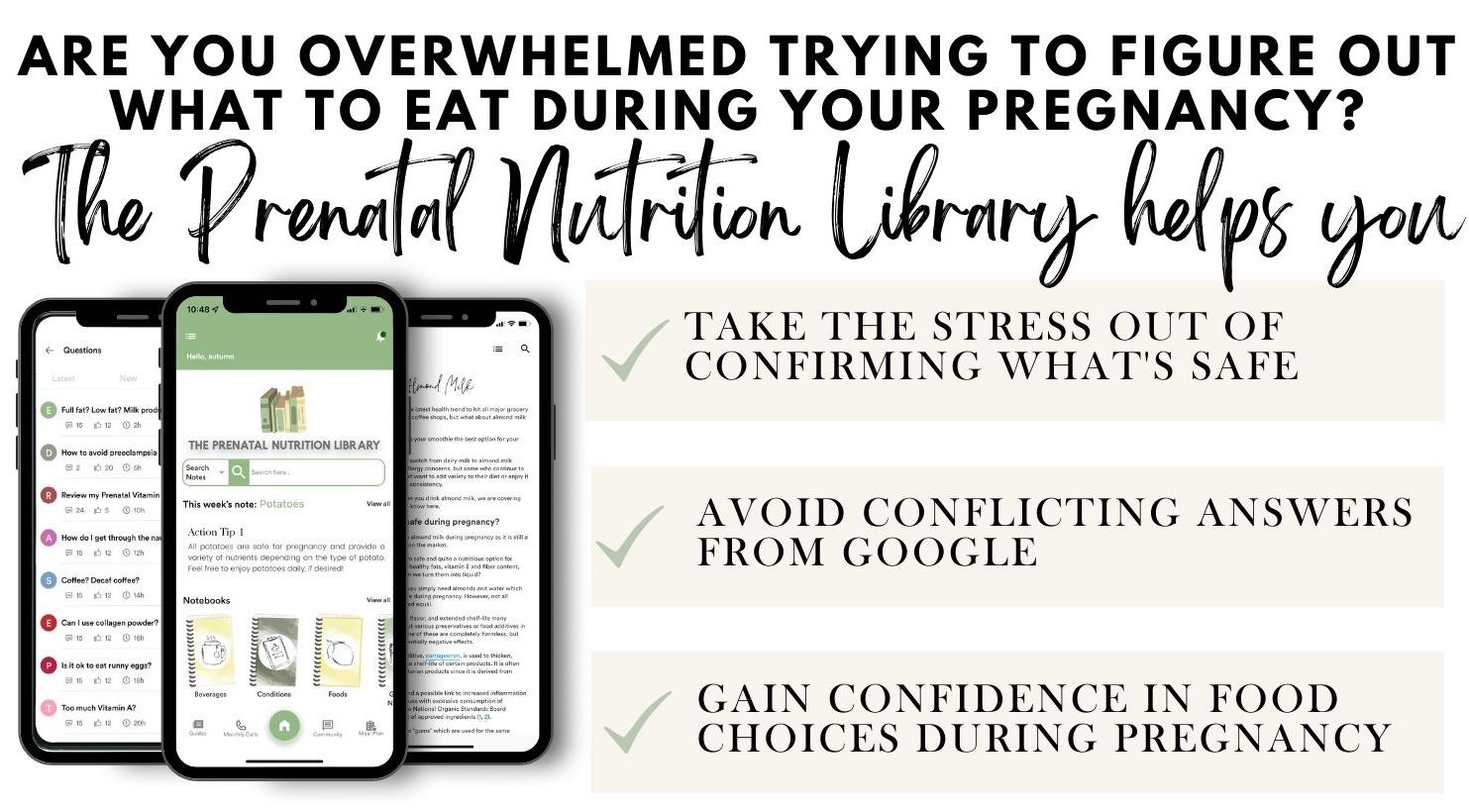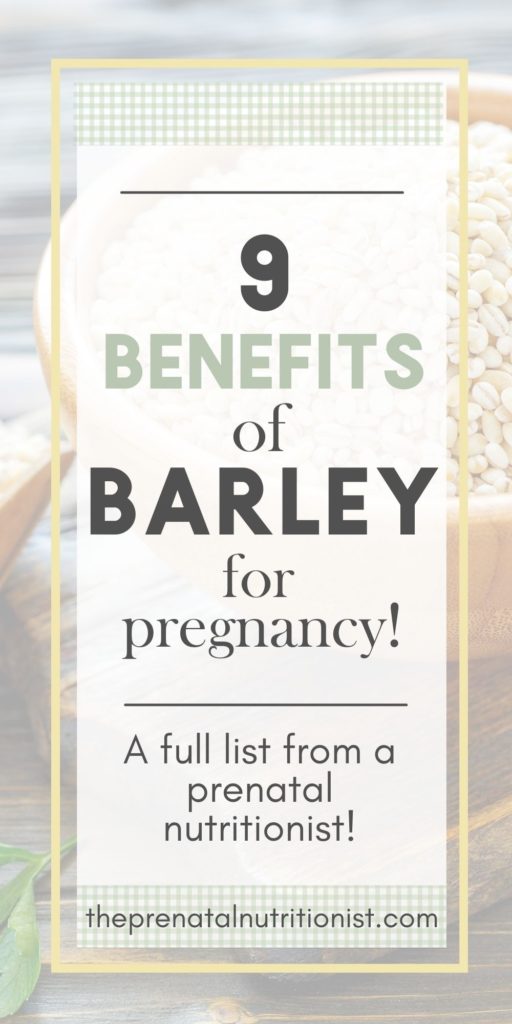
Barley is one of the oldest and most popular cereal grains in the world. Most often, we eat it in the form of bread, soups, and stews. Many pregnant women swear by drinking barley water during pregnancy, claiming that it offers a myriad of health benefits. We will dive into if this is actually true (or safe for pregnancy) below!
Questions about barley?? Let’s clear them up!
Today, I’m sharing a round-up of the benefits and potential side effects of consuming barley while pregnant. If you have a gluten intolerance this will not be the best grain option for you.
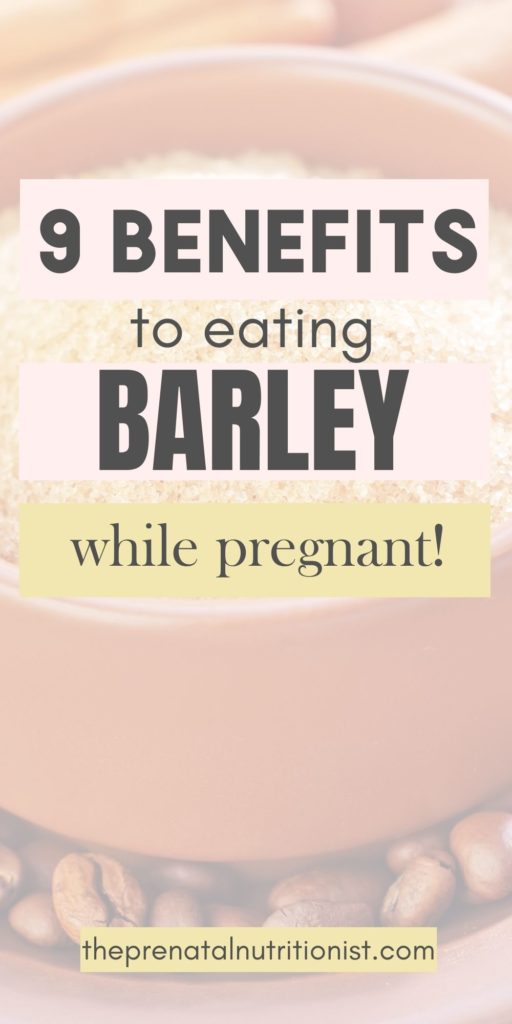
9 Barley Benefits For Pregnancy
Barley contains essential nutrients that support baby’s development.
Barley is a great source of calcium, potassium, non-heme (plant-based) iron, and magnesium, all of which are essential nutrients for a growing fetus. Just one cup of cooked barley has an abundance of nutrients that help support your baby’s overall development.
Barley can help prevent gastrointestinal problems.
Barley is 17% fiber, and it has more fiber than most other whole cereal grains. Its high fiber content makes it a great addition to your pregnancy diet to reduce constipation and the risk of hemorrhoids. Just be sure to drink plenty of fluids to help prevent constipation!
Barely contains folate, which helps to reduce the risk of neural tube defects in infants.
Folate, also known as vitamin B-9 (and different than folic acid!), is important for pregnant women. Consuming adequate folate reduces the likelihood of neural tube defects. These are birth defects of the brain and spinal cord.
Pregnant people should aim for at least 600 mcg of folate per day. One cup of cooked, pearled barley contains about 25 mcg of folate. Barley, in conjunction with plenty of other folate-rich foods and a quality prenatal vitamin, can help to meet your daily recommended intake.
The consumption of barley water may help reduce water retention or swelling.
Anecdotally, many pregnant people report the properties of barely water have helped with common pregnancy symptoms. It may help relieve water retention or pregnancy swelling. It’s okay to incorporate barely water in moderation and along with other fluid choices, but it is also not going to be a miracle or cure-all. Check out some of these other best drinks for pregnancy.
Barely is a versatile grain choice.
Barely works well in many dishes, which makes it a great batch or meal prep food choice. You can prep several servings of barely at the beginning of the week and use it across multiple meals. It works well in salads, soups, stews, and grain bowls. You can even serve it alongside eggs, sautéed spinach, and avocado slices. Now that’s a well-balanced, nutrient-packed meal with choline, fiber, vitamins and minerals, and healthy fats.
People who eat barley grains are at a reduced risk for chronic diseases.
Those who regularly consume barley are at a lower risk of developing chronic diseases such as diabetes, cancer, obesity, and heart disease. The fiber and phytochemicals in barley grains, like flavonoids, tocols, lignans, and phenolic acids, are thought to be responsible for this benefit.
Eating barley is good for your heart.
If you are at all concerned about your cardiovascular health, add barley to your diet. Barley contains a good amount of soluble fiber, which can support healthy cholesterol levels and may reduce your risk of heart disease.
Barley is a great option for an expecting mother with gestational diabetes.
The glycemic index is a measure of how quickly a food raises blood sugar. Barley is classified as a low-glycemic food. This makes it a great grain choice for those with gestational diabetes too! Of course, we still recommend pairing your carbohydrate foods with some protein and healthy fat to make your meals more blood sugar friendly and it is best consumed in moderation. So, eat barley alongside your favorite protein like chicken or steak to manage blood sugar levels.
Barley is budget-friendly and easy to add to your pregnancy diet.
If you’re looking for a pantry staple that is budget-friendly, barley is a great option. You only need barley, water or broth, and a few simple seasonings to whip up this grain. As mentioned above, it’s versatile, which also makes it easy to add to your pregnancy diet.
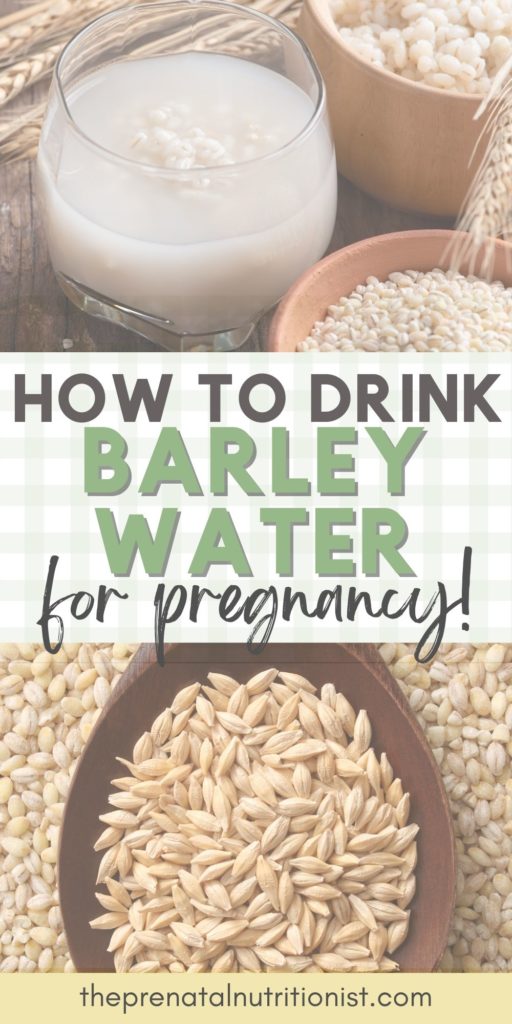
How To Drink Barley Water During Pregnancy
How to prepare your own barley water.
If you’re intrigued by the idea of barley water, it’s surprisingly easy to make your own at home. The only ingredients you need are barley, cups of water, and either salt or sugar for taste.
Start by thoroughly washing one-fourth cup of barley grains, then soak the grains in water for at least four hours. Then, strain the water and add three cups of fresh water. Cook the mixture until the grains are soft and the water is translucent.
Strain the liquid, then add a bit of salt or sugar to enhance the taste. If the taste is still too bland for your preference, try adding a little pasteurized honey or lemon juice. Regardless, allow the mixture to cool, but drink it warm.
Practice moderation when drinking barley water during pregnancy.
Again, barley water is not a miracle drink for pregnancy. While it’s not “unsafe,” most pregnant women should consume barley water in moderation. If you choose to incorporate it, it’s best to still consume plenty of water and other fluids, too, and not make barley water your only beverage choice and limited to a moderate amount. If you aren’t sure how much to drink, talk to your healthcare provider. They’ll be happy to help!
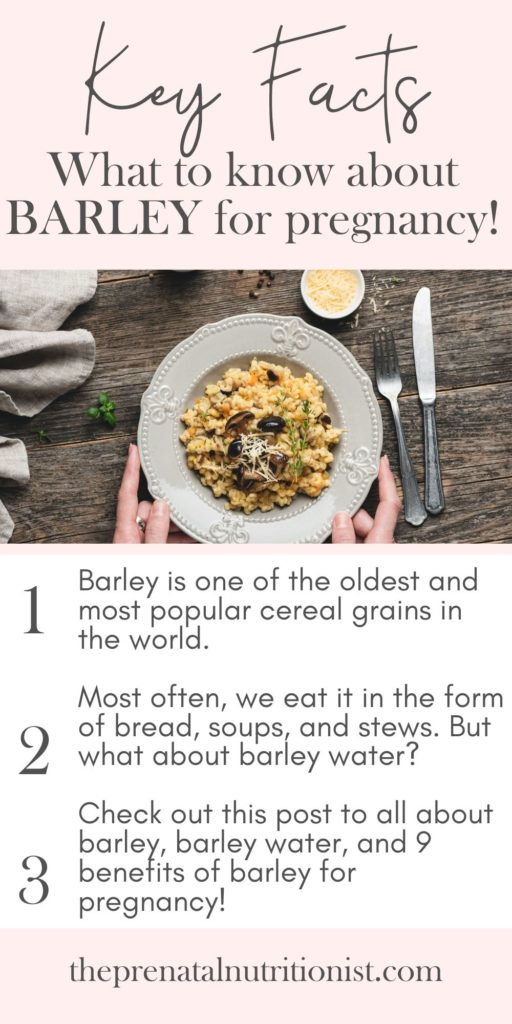
What if you have celiac disease?
Celiac disease is a lifelong autoimmune condition that causes inflammation of the gastrointestinal tract, specifically the small intestine, when exposed to gluten. If you have this gluten intolerance, you should avoid barley during pregnancy. Adding barley to your diet could lead to common symptoms of celiac disease like diarrhea, abdominal pain, bloating, indigestion, constipation, fatigue, and weight loss. Try including gluten-free options like quinoa, oats, or corn. Properly managing celiac disease throughout your pregnancy is key. If you are unsure of exactly how to do this, get in touch with a registered dietitian who can create a plan for you.
Barley is a nutritious food with a myriad of benefits for pregnancy
If barley is not for you, there are many different types of grains you can enjoy during pregnancy. Look for minimally processed products and those with 100 percent whole grains as the first ingredient. There is no one best food or food that has to be included during pregnancy. The best pregnancy diet is one that includes a variety of nutritious and delicious foods. Barley is a grain with tons of benefits for pregnant people and their growing babies if you enjoy it. If you do not love whole grains, you can still have a healthy pregnancy without them and choose other whole foods with the same or more nutrients than whole grains.
For more information on the best foods to include in your pregnancy diet and to stay up-to-date on the latest pregnancy nutrition recommendations, sign up for The Prenatal Nutrition Library. TPNL is your one-stop, all-inclusive hub for ALL things prenatal nutrition that provides evidence-based, clear recommendations to ensure you have a feel-good pregnancy!
The Prenatal Nutrition Library also has trimester-specific meal plans, so you don’t have to figure out what to eat every week, and you will know baby is getting the nutrients they need. Click here!



